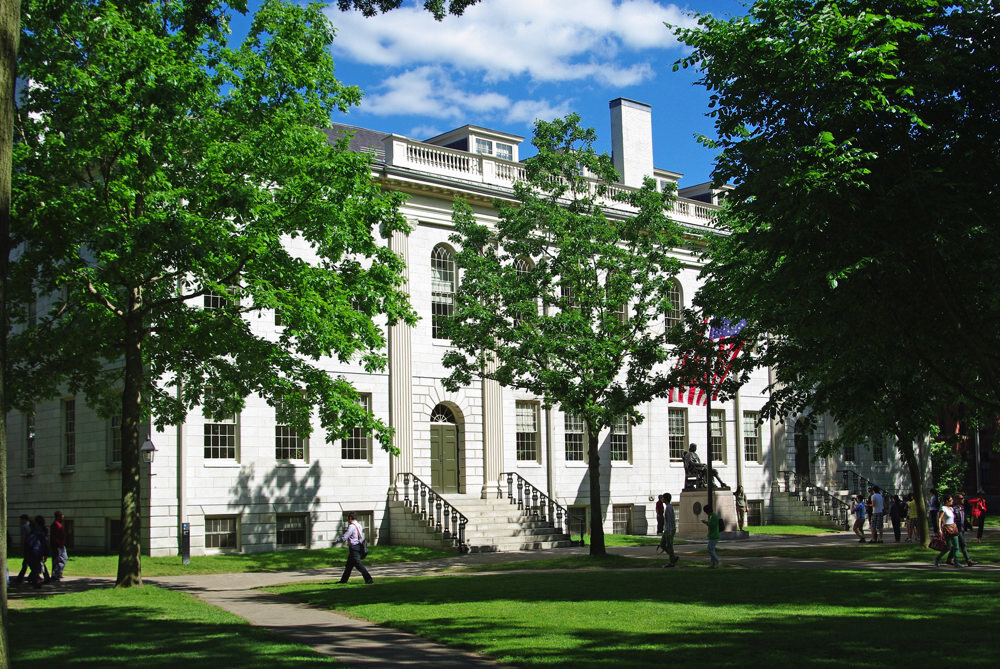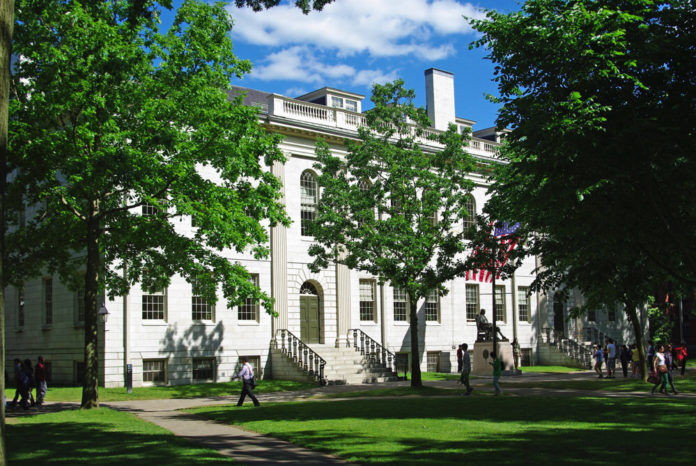
The Faculty of Arts and Sciences (FAS) cleared up its remaining routine tasks during this most non-routine of years at its last regular meeting of the academic year on Tuesday afternoon. Many of the prior meetings had been largely given over to hearing reports, but significant academic action was taken in the April session, when the new doctoral program in quantum science and engineering was approved.
Today, at the request of the faculty’s docket committee, President Lawrence S. Bacow, Provost Alan Garber, and FAS dean Claudine Gay spelled out the steps Harvard and the FAS have taken to prevent any recurrence of the University’s engagement with individuals like the convicted sex offender (and donor) Jeffrey Epstein, including promulgation of the first public gift policy, steps to assure its enforcement, and changes in the way the faculty grants visiting fellowships (of the sort improperly granted Epstein).
In addition, the faculty aired concerns about the new Harvard system for reporting potential conflicts of interest and conflicts of commitment. It is intended to assure compliance with federal sponsored-research regulations, but in its early implementation seems to have entangled humanities and social-sciences scholars who do not receive such funding but now appear to have to report modest sums received in the routine course of their academic work (such as royalties on scholarly books or fees for serving on dissertation committees). Refinements of the system were promised.
Among the formalities today were pro forma votes to approve Extension School offerings and the Courses of Instruction for 2021-2022. But even among these housekeeping chores, echoes of the unusual times popped up in the agenda items.
• Handbook for Students. Harvard College dean Rakesh Khurana presented the annual tweaks to the language in the official compilation of rules and other necessary information for undergraduates. The many emergency steps adopted by the Standing Committee on Undergraduate Educational Policy in response to the pandemic—various extensions of time, international study away, the deadline for electing pass/fail evaluation, credit for summer 2021 courses—are being removed from the 2021-2022 edition: a hopeful omen.
In a series of changes Khurana presumably never wished to make, the Handbook language pertaining to the regulation of unrecognized single-gender social organizations (USGSOs: the final clubs and fraternities and sororities) was stricken. This was the inevitable result of the June 2020 U.S. Supreme Court decision in Bostock v. Clayton County, ruling that federal law bars employers from discriminating on the basis of sexual orientation or transgender status. The University announced then that the decision posed insuperable legal problems for the USGSO policy, and rescinded it. Khurana and then-president Drew Gilpin Faust had championed the policy, and the Corporation (on which Bacow then served even before becoming president) imposed it in late 2017.
• Online reach. In her message to the faculty, Nancy Coleman, dean of the Division of Continuing Education and University Extension, documented the school’s reach during the pandemic: 746 unique courses, all online; 35,334 course enrollments, up 13 percent from the prior year. As previously reported, the school’s online prowess enabled it to transform its course offerings and to extend its international reach, a focus of her strategies for growth (see “Online Takes Off,” March-April, page 14).
• Teaching honors. Continuing an annual tradition, Dean Gay awarded prizes for teaching, advising, and mentoring—a special honor for those recognized under what were undoubtedly the most challenging circumstances most had ever faced leading a class. FAS’s highest commendation for teaching is the Harvard College Professorship, conferred in recognition of distinguished contributions to undergraduate teaching (in general education and concentrations), advising, and mentoring, as well as work in graduate education and research. This year’s honorands, who hold the title for five years and receive additional support for their research, are:
• Stephen Chong, McKay professor of computer science and faculty dean of Winthrop House;
• Sean D. Kelly, Martignetti professor of philosophy and faculty dean of Dunster House (who led the most recent review of General Education);
• Deidre Lynch, Bernbaum professor of literature (profiled here);
• Andrew Murray. Smith professor of molecular genetics, director of the Rowland Institute, and director of the John Harvard Distinguished Science Fellows Program; and
Winners of the Roslyn Abramson Award for outstanding undergraduate teaching are Demba Ba, associate professor of electrical engineering and bioengineering, and Robin Hopkins, Loeb associate professor of the natural sciences.
And the Everett Mendelsohn Excellence in Mentoring Award—established by the Graduate Student Council to recognize faculty members who offer exceptional support and guidance in students’ research, education, professional and personal development, and career plans during long and sometimes lonely years of study—is conferred on these honorands:
• Robin Bernstein, Dillon professor of American history and professor of African and African American studies and of studies of women, gender, and sexuality (and a Harvard College Professor);
• Sheila Jasanoff, Pforzheimer professor of science and technology studies and professor of environmental science and public policy (at the Kennedy School of Government), and an affiliate of the departments of history of science and of government;
• Erica Kenney, assistant professor of public health nutrition and director of the Ph.D. program in the field;
• Hannah Marcus, assistant professor of the history of science; and
• Christopher Rycroft, Loeb associate professor of engineering and applied sciences.
• A giant, remembered. One of the Memorial Minutes presented to the faculty recognized the life and service of a towering professor. Sociologist Nathan Glazer, professor of education and social structure emeritus (who died in 2019), was active in FAS and the Graduate Schools of Education and of Design. He was lauded as “an academic and public intellectual who greatly influenced not only scholarship on American culture and ethnicity but also post-war American intellectual discourse on public life and policy,” notably through The Lonely Crowd: A Study of the Changing American Character (with David Riesman ’31, J.D. ’34, LL.D. ’90, and Reuel Denney) and Beyond the Melting Pot: The Negroes, Puerto Ricans, Jews, Italians, and Irish of New York City (with Daniel Patrick Moynihan, LL.D. ’02). Though published decades ago, they remain fundamental works on American individualism and the matter of persisting ethnic identity (as opposed to an assimilationist melting pot)—issues very much alive today.
So are the policy implications. The Minute said of Glazer, “He was that most unusual of intellectuals, one not afraid to change his mind.” Accordingly:
His work influenced not only scholarship but also the revival of ethnicity as a socio-political force during the 1970s. However, when this movement evolved to push for affirmative action toward equal representation in the workplace and academia, Glazer became a leading critic, arguing against group over individual rights in his influential work Affirmative Discrimination: Ethnic Inequality and Public Policy (1975). Nonetheless, two decades later, in light of the evidence of persisting Black disadvantage and segregation, Glazer reconsidered both his earlier view on the inevitability of assimilation in America and his criticism of affirmative action. His book We Are All Multiculturalists Now (1997) recognized the persisting injustices and structural inequalities Blacks experienced in the U.S. and acknowledged, somewhat cautiously, the need for special action on their behalf. This shift elicited dismay and outrage from conservatives of the time, who had viewed him as an important intellectual leader.
Given this willingness to reconsider and adapt, the Minute observed, “An important assessment of his life and work in the New York Times Magazine opened with the ironic bon mot that ‘Nathan Glazer has had more second thoughts in his lifetime than most people have had thoughts.’” In the mid 1960s, he was a contributor to The Public Interest, which became the policy journal of neoconservatism; although he became co-editor in 1975, Glazer did not embrace the term, and considered himself a “centrist Democrat,” according to the Minute. “Glazer spoke truly,” it continued, “when he said, ‘I consider myself pragmatic, rather than a man of the left or a man of the right.’”
There may not be much room for such self-styled pragmatists in today’s heated political discourse, but there is, and ought to be, plenty of room for considering his like within the academy. The Minute was composed by Michèle Lamont (professor of sociology and of African and African American studies and Goldman professor of European studies), Mario Small (Grafstein Family professor of sociology), and Orlando Patterson (Cowles professor of sociology)—a diverse group of intellectuals, many of whose views must have differed from Glazer’s, but who came together with special force to laud their late colleague.








